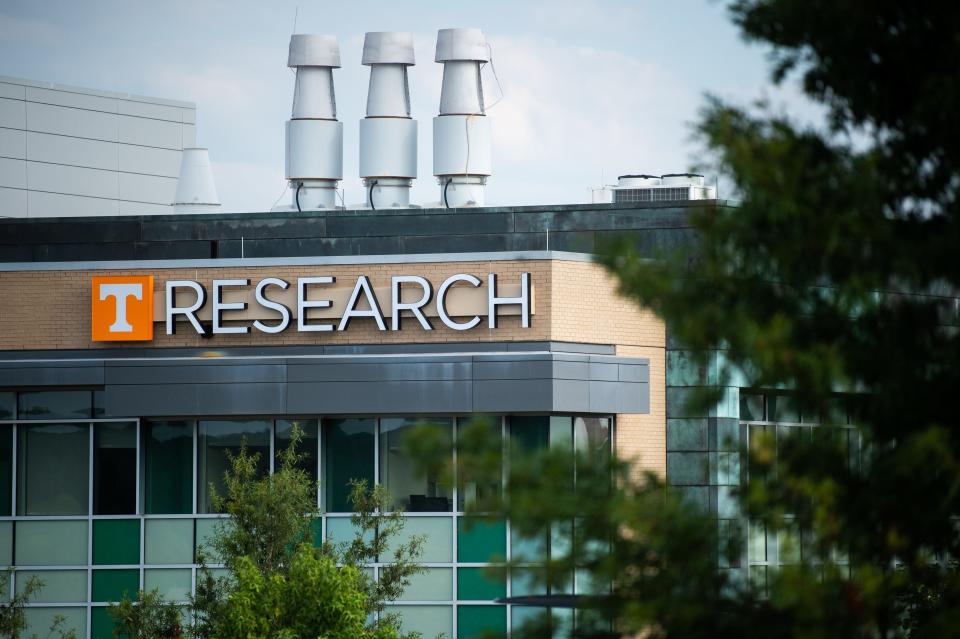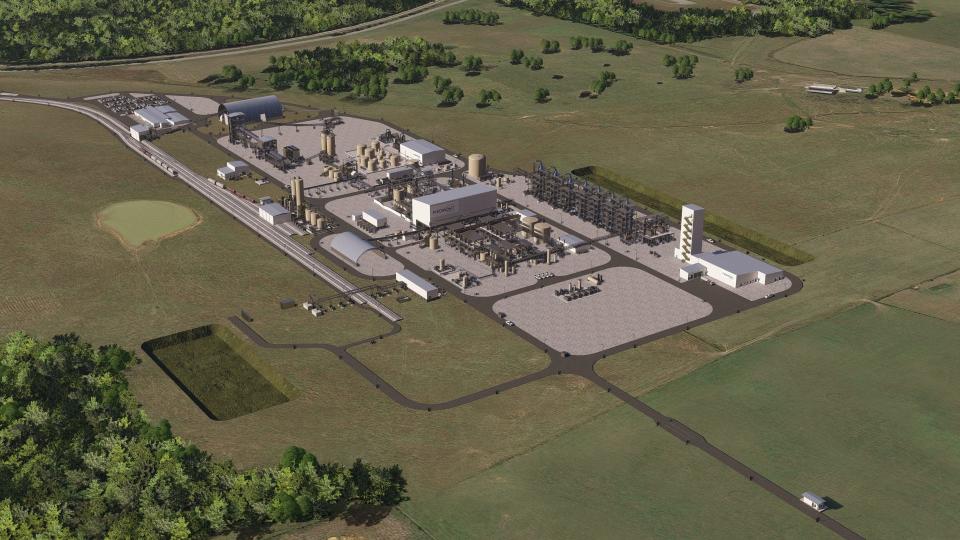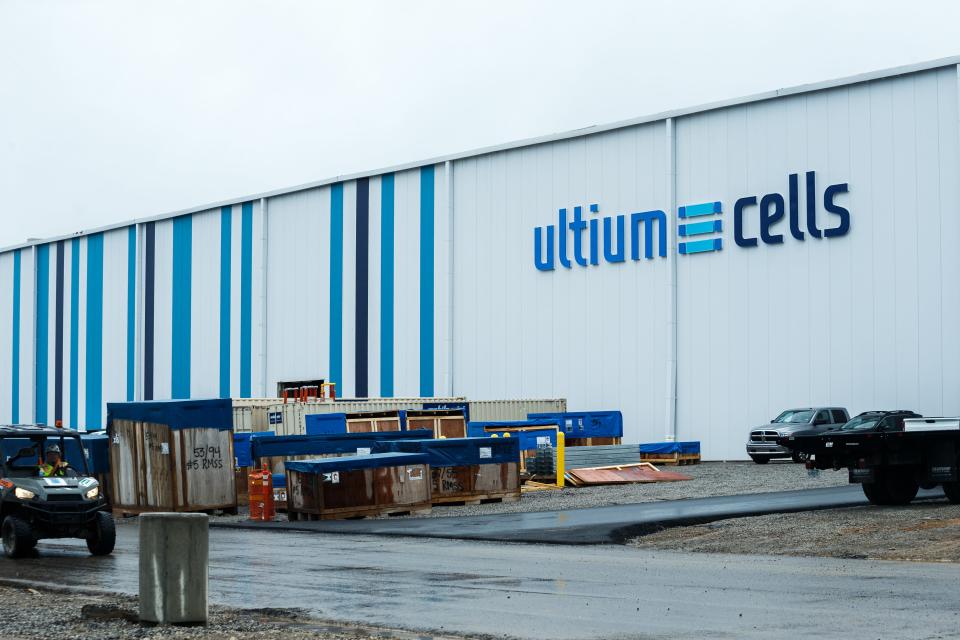How Tennessee's EV boom could benefit from the massive lithium deposit found in the US
In the footprint of an ancient supervolcano in northern Nevada, researchers made a discovery that could change the future of clean energy in the U.S. and accelerate the pace of Tennessee's booming electric car industry 2,000 miles to the east.
Embedded in the volcanic clay of Thacker Pass near the Oregon border is the world's largest deposit of lithium, a vital element for rechargeable batteries in electric cars, smartphones and electric grid storage. The mineral-rich sediment, left by an eruption some 16 million years ago, could upend both global and domestic supply chains in the U.S.'s favor.
For Tennessee companies investing in EV technology, the welcome news could mean faster consumer adoption of electric cars and a more sustainable market for their products.
Lithium batteries were called the "new oil" by Elon Musk, CEO of the world's leading EV manufacturer Tesla, because of the central role they play in the rapidly expanding EV market. American automakers like GM and Ford have scrambled to source more lithium from within the U.S. and ramp up domestic EV and battery cell production, largely in Tennessee.
General Motors, the parent company of Chevrolet, Buick and GMC, invested $650 million in the Thacker Pass project to get exclusive rights to the lithium produced at the site in its first phase, estimated to supply the raw material for up to one million electric cars. Lithium Americas, the company that owns the site, said it plans to begin producing 80,000 tons of lithium a year beginning in 2026, for average annual earnings of over $1 billion.
The company's agreement with GM could provide a key element for the Ultium Cells plant in Spring Hill, Tennessee, a partnership between GM and South Korean company LG Energy Solution. Production at the giant $2.3 billion EV battery manufacturing plant is expected to begin later this year, bringing 1,300 jobs to Maury County. It will support GM's goal of carbon neutrality in its products and operations by 2040.
The Spring Hill plant is one of several EV production sites in every corner of Tennessee, including Ford's BlueOval City in West Tennessee and LG's planned cathode production facility in Clarksville, set to be the largest of its kind in the country.

American lithium supply chain could benefit Tennessee
Andrew Hanna and his co-workers at the Safire Technology Group have discussed the monumental news from Lithium Americas, even though lithium mining is far upstream from the company's work on lithium-ion battery additives.
The Safire Group is busy commercializing a series of patents from Oak Ridge National Laboratory for a hybrid additive for lithium-ion batteries that is a liquid under normal operating conditions, but turns into a solid when touched or crushed, much like cornstarch in water. The Safe Impact Resistant Electrolyte, or SAFIRE, protects drivers or operators from fires in the event of a crash. It was invented by Gabriel Veith, a distinguished staff scientist in the national lab's chemical sciences division.
Hanna, who leads product development and branding for Safire, said its identity as an American company is central to its success. The company announced earlier this year that it would invest in Knoxville with a research space at the Spark Innovation Center at the University of Tennessee's Cherokee Research Farm.
"American-made energy, and I would say even an American integrated supply chain from the upstream minerals through the value chain of battery manufacturing, is very important to us,” Hanna said. “We’re very proud to be a part of that American supply chain.”
Safire has contracts with the U.S. Department of Defense and U.S. Air Force, where preventing fires from lithium-ion batteries is critical. In that sense, the company is like the lab where its product began. ORNL, the largest of the Department of Energy's national labs, often works with the federal government on pressing national issues like clean energy and national security.
After its scientists have invented technologies with industrial applications, the lab sometimes licenses them to companies like Safire. The news that the U.S. might now be home to the world's largest lithium deposit could mean a speeding up in the battery supply chain that gives Safire its purpose and that brought it to Knoxville.
“A major part of our business model is to be in electric vehicles and to the extent that that’s accelerated and adopted more readily, as an American company based in the U.S., the better for our business and our technology," Hanna said.
ORNL announced in September that its researchers had developed a lithium-ion battery material that recharges 80% in 10 minutes and maintains that recharging speed for 1,500 cycles. The lab has not announced a licensing agreement for the material.
As Knoxville and Oak Ridge companies apply their research acumen to lithium-ion batteries, their discoveries could impact manufacturing at the Ford mega plant under construction in the town of Stanton outside of Memphis. BlueOval City, the largest of Ford's plants, will produce EV batteries and build the company's next generation of electric truck in a pair of facilities with close to 6,000 jobs added.
Why one lithium company chose East Tennessee for new facility
In East Tennessee, Piedmont Lithium is bringing a lithium production facility to the town of Etowah in McMinn County. The plant will convert a hard rock sourced in Ghana into a lithium ion for use in batteries, adding 120 jobs. Construction on the Tennessee Lithium facility is expected to begin mid-2024 and finish in 2026, said Austin Devaney, the company's chief commercial officer.
Piedmont Lithium, based in North Carolina, chose East Tennessee largely because of the Tennessee Valley Authority, which Devaney said makes the region “a very attractive place to produce products that utilize energy and reduce the carbon footprint while doing that.” The lithium produced at the facility will be sold to cathode producers, who then sell their product to battery cell producers.
Though there are very few cathode producers in the U.S., LG Chem, the parent company of LG Energy Solutions, announced last year a $3.2 billion investment in Clarksville for the nation's largest cathode manufacturing facility. By 2027, the company hopes to produce material for 1.2 million EV batteries each year at the West Tennessee plant.

“As we transition to an electric vehicle and transportation economy, I think it's important that we do everything we can in our power to have that capability reside within the United States, as opposed to any foreign adversary,” Devaney said. “If the United States is going to succeed in transitioning to electric vehicles, we need other people to also bring on capacity and it's a lot of heavy lifting and a lot of money."
The Etowah facility is expected to cost more than $800 million, Devaney said. The project received a $142 million grant from the Bipartisan Infrastructure Law in fall 2022.
Though Piedmont Lithium will source raw material from Ghana through a partnership with Atlantic Lithium, Devaney said the company was sending geologists "all over the world to look for additional minerals, here in the United States and abroad.”
More domestic lithium means lower EV costs down the road
The Biden administration wants 50% of all new vehicle sales to be electric in 2030. By that year, the lithium-ion battery market is expected to have grown five to 10 times bigger, according to the Federal Consortium for Advanced Batteries. In its National Blueprint for Lithium Batteries, the consortium of federal departments said the U.S. “will establish a secure battery materials and technology supply chain” by 2030. Its top goals are to secure domestic raw materials and processing.
The EV revolution has been felt in all corners of the lithium-ion battery industry, even by companies that don't make batteries for automakers like Ford and GM.
Kevin Bennett owns Lithium Pros, a Knoxville company that specializes in making marine and racing lithium-ion batteries. The company builds battery packs, not battery cells, the complex devices that convert chemical energy into an electric charge. Lithium Pros purchases cells from a company in China, which Bennett said is the "absolute leader" in lithium-ion batteries.
The U.S., meanwhile, is in a game of catch-up. Last October, President Biden announced the creation of the American Battery Materials Initiative, pushing the entire federal government to invest in domestic EV battery raw materials and production. The Bipartisan Infrastructure Law alone put $7 billion into the industry, much of it through Department of Energy grants.
Bennett is getting more and more calls asking if he can produce 400-volt battery packs, the minimum power needed for an EV. His company currently produces packs of 48 volts or fewer, but is considering retooling to meet EV demand.

“It's unstoppable, and the United States has to realize that we're behind the curve worldwide,” Bennett said. “China has a lot more EVs than the United States does. Europe is more electrified and has more diesel than the United States. So it's not like the United States came up with this idea. The United States is behind the curve.”
Though lithium takes up a tiny percentage of a battery pack by volume, the scarcity of the element makes it the critical ingredient. As more and more sources of lithium are found, like in the volcanic sediment of Nevada or the briny springs of Southern California's Salton Sea, the cost of lithium has decreased.
In the 12 years he's been in the business, Bennett said, costs for lithium-ion battery cells have decreased 80%. Though the price of lithium is expected to rise in the immediate future with increased EV demand, it is expected to fall long-term as supply of the raw material increases. That means cheaper electric cars for consumers across the country, including in Tennessee.
“When you go to buy a car, it's going to make the overall cost of the battery pack in the car less,” Bennett said. “I think long-term, electric cars will be less expensive than gasoline cars.”
Why are lithium and Thacker Pass so vital to the future of electric cars?
Lithium was first found at Thacker Pass in the 1970s and the site was known to be the largest lithium deposit in the U.S., but is now believed to hold between 20 and 40 million tons of lithium, far outstripping the previous world record holder, a salt flat in Bolivia. The revised estimate was published in an academic article written by researchers with Lithium Americas, GNS Science and Oregon State University.
Lithium stores electricity at a high density, making it ideal for batteries that fuel electric cars and store solar and wind energy. A high-stakes global rush to find new sources of the metal, which is most abundant in hard rock and salt brines, has cost billions of dollars. Global consumption of lithium increased 41% in 2022 over the year before and, excluding the U.S., global lithium production increased 21% to 130,000 tons in the same time, according to the U.S. Geological Survey.
The U.S. imports nearly all of its lithium from Argentina, Chile and China. In addition to extracting lithium, China dominates the lithium processing and EV battery supply chain. In a statement adjoining millions in funding for EV research, the Department of Energy said the reliance on imports presented "a vulnerability in the domestic supply chain."
These global dynamics could begin to shift if Lithium Americas meets its goal of beginning production in 2026, an objective complicated by protests from environmentalists and Native American tribes with ancestral ties to the land. The company signed an agreement with a Nevada tribe last October including a pledge to build a community center for the tribe with a daycare and cultural facility.
Capital costs to begin production are $2.2 billion, the company reports, and include construction of a sulfuric acid plant to produce carbon-free power for on-site lithium processing.
With the Nevada deposit added to its arsenal, the U.S. is in a position to become the "Saudi Arabia of lithium," said Sanjiv Malhotra, founder and CEO of Sparkz, a lithium-ion battery manufacturer that partnered with Oak Ridge National Laboratory to license cobalt-free technology. By developing lithium-ion batteries free of nickel and cobalt, Sparkz already is able to source much of its material from inside the U.S., making the domestic supply chain its central focus.
Companies that focus on domestic EV battery supply will be instrumental to the Biden administration's goal of a carbon-free electric grid by 2035. Though it is based in California, Sparkz operates a research and development center in Knoxville.
"The United States is well on its way to become basically the global leader in electrification of vehicles and particularly for lithium batteries, as long as we're not dependent on nickel and cobalt and any other raw material that is sourced from sources that are not aligned with us geopolitically," Malhotra said. "This provides the U.S. with, I would say, a major leg over China in essentially building a hub in the United States."
Daniel Dassow is a growth and development reporter focused on technology. Phone 423-637-0878. Email daniel.dassow@knoxnews.com.
Support strong local journalism by subscribing at knoxnews.com/subscribe.
This article originally appeared on Knoxville News Sentinel: Tennessee EV manufacturing benefits from lithium deposit in Nevada

